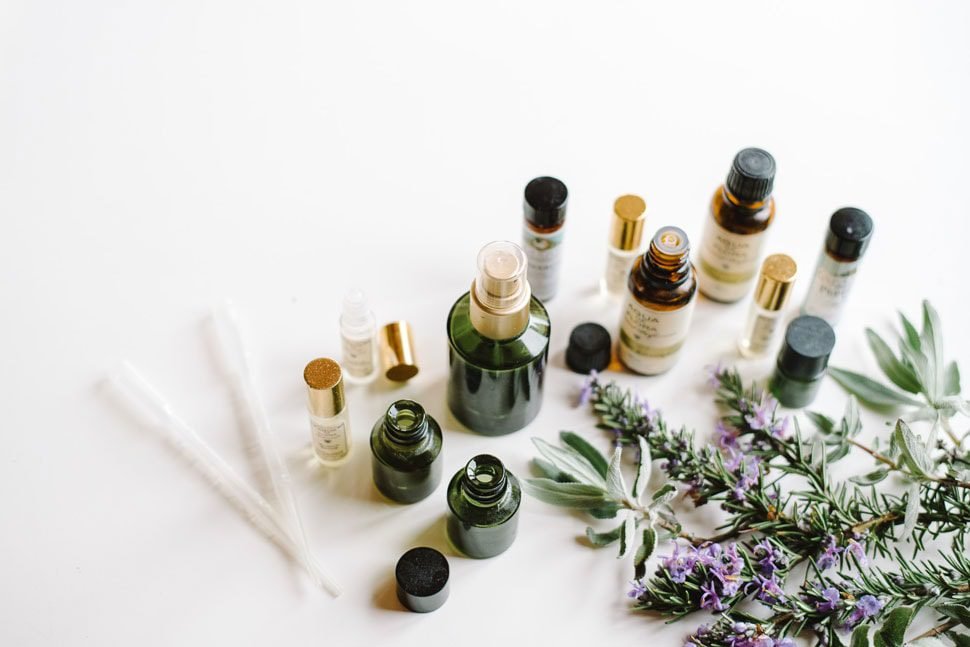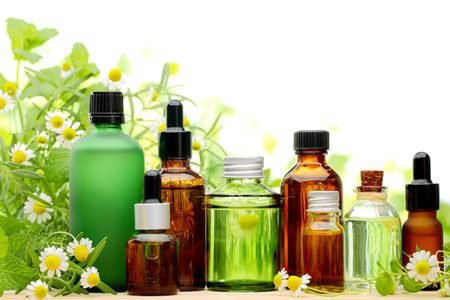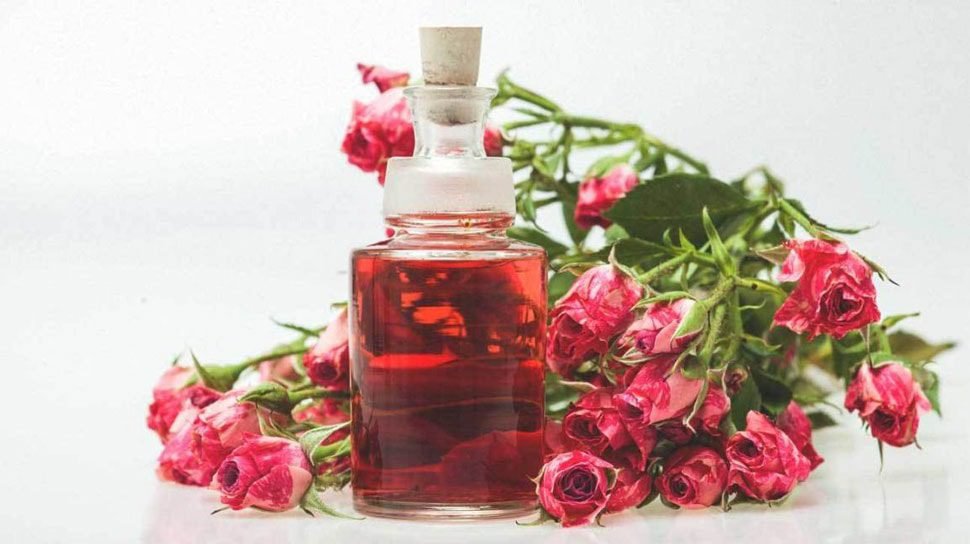
Are Essential Oils Harmful or Helpful?
We see them everywhere. From the miniature glass bottles composed of a singular essence, to skincare products containing a variety of plant-derived oils, to home cleaning products with the customary citrus aroma. And you likely know someone, or yourself, experiment with them as homeopathic remedies. But what exactly are essential oils? After all, they have been used for millennia to cure everything from stress and pain to ailments of every variety. Are they truly advantageous or merely a pleasurable but ineffectual practice?
The Basics
Essential oils are compounds extracted from plants (flowers, fruit, leaves or seeds) obtained through distillation or mechanical methods such as cold pressing. The oils capture the plant’s distinctive scent or essence and are highly concentrated. Once extracted, they are combined with a carrier oil for personal use. They can be inhaled via a diffuser, rubbed on the body as a lotion, applied to pulse points, or as a bath or massage oil. They are also frequently utilized in candles and scent sticks. In rare cases, they are taken as an ingestible, though this is not recommended as there is no FDA regulation and the side effects can be toxic.
Once the selected aroma is inhaled, it stimulates areas of the limbic system. This is the part of the brain that controls emotions, mood, olfactory sensations, and long-term memory. It also controls some physiological functions such as heart rate and blood pressure. This connection to memory, emotions, and equilibrium can help explain the positive effect of essential oils on mood and the releasing of stress.
Real Health Benefits
A pleasant fragrance is all well and good, but do essential oils have any measurable health benefits? While most studies are inconclusive, some hospital and clinics have been using aromatherapy as a complimentary therapy (CAM) to patients undergoing medical treatment or when in recovery. Staff and patients report a more positive experience and outcome with aromatherapy accompanying their primary treatment plan including;
- Relief from anxiety and depression.
- Improved quality of life, particularly for people with chronic health conditions.
- Needle sticks and are less painful, such as for patients receiving dialysis or chemotherapy.
- Improved sleep during hospitalization.
- Enhances the quality of life for those with dementia
- Reduction of pain for people with kidney stones
- Ease pain for women in labor and decrease the need for pain medication
While these may seem to be merely “feel good” tonics to serious ailments, people of all conditions, especially those who experience chronic pain, benefit from alternative methods of easing discomfort and subsequent depression. The ensuing positive affect can lead to a more rapid recovery and positive general outlook.
Which One Do I Choose?
There are over 90 essential oils and an infinite amount of combinations for the skilled or curious aroma mixologist. Below are a few of the most commonly used oils and its primary application.

Lavender
Perhaps the most easily recognized and universally loved aromas. The herbaceous light floral is known to promote relaxation and reduce tension headaches. Applied topically, it may alleviate itching and inflammation. In skin care products, it’s best for oily skin types. Not recommended for dry or mature skin.
Suggested Use: Inhaled directly or via diffuser. Applied directly to infected area.
Peppermint
From headaches to indigestion, the cooling minty fragrance is immediately recognizable. It is widely used in massage and balms to relieve sore muscles, minor burns, and invigorate the senses.
Suggested use: Applied to temples for headaches or areas of muscle pain or soreness, such as the feet. Do not ingest to freshen breath, as this has harmful side effects. Stick to breathe mints.
Spearmint
The slightly sweeter sister to peppermint, it provides many of the same benefits as well as an antifungal and insect repellent.
Suggested Use: Add a few droplets to bath water to reduce fever, fatigue, and nasal congestion. In a lotion or oil it can help cleanse and unclog pores.
Tea Tree Oil
Pungent and medicinal, tea tree oil is common in soap, shampoo, and products to treat due to its antiviral and antibacterial qualities. It may also heal minor wounds.
Suggested Use: Place a few drops on fresh wound dressing to kill bacteria or add a cup of water as a mouthwash. Relieve dandruff by applying to your regular shampoo.


Camphor
Mined from the evergreen trees of Asia, the familiar medicinal extract is most commonly used to relieve congestion, irritation, and to kill insects.
Suggested Use: Added to a lotion or balm, it eases pain by causing numbness to nerve endings. Rub a few drops on your pillow to induce sleep or add to an ointment for rashes or itching.
Lemon
The most invigorating of the citrus oils, it boosts energy, may fight anemia, and relieve nausea.
Suggested Use: Add to your skin cream for brightening and antioxidant benefits. Keep in mind lemon’s photosensitivity before application. Use in a diffuser or liquid soap as an uplifting mood boost, or to home cleansers as a disinfectant.
Basil
Fresh and minty, it is commonly used as a cold or flu remedy and muscle relaxer.
Suggested Use: Add to a bath to alleviate flu symptoms and relax muscles. Inhaling via a diffuser will induce a restful night’s sleep when suffering from a cold.
Orange
Bursting with Vitamin C, it is most commonly used in beauty serums and creams to brighten and smooth the complexion.
Suggested Use: Like lemon, add to a skin cream or lotion to even skin tone and promote a healthy complexion. Or inhale deeply for a burst of energy.


Chamomile
Known for its subtle and gentle scent, Chamomile promotes calm and tranquility. As a skin aid, it is known to treat eczema, inflammation, and irritation.
Suggested Use: Added to an ointment or balm to relieve skin discomfort and itching. The calming effects work well on children and babies, so a diffuser with chamomile oil or a drop on a pillow or blanket will help keep them calm.
Cedarwood
The woody aroma promotes tranquility and deep calm. A source of numerous health benefits including combating acne and skin irritations, it blends well with other oils and can balance scents that are too sweet or sharp.
Suggested Use: Add droplets to a diffuser to relieve respiratory discomfort such as asthma or coughing. Deep inhalation is known to facilitate relaxed respiration and encourage sleep. Never ingest cedarwood as it has very harmful side effects.
Rose
This sophisticated floral is used widely in face and body oils for its antioxidant properties and leaving skin supple and more youthful.
Suggested Use: Add drops to a facial oil or serum for anti-aging or to a bath for a romantic calm.
Clary Sage
Woody and herbal, it’s known to invigorate the scalp and promote healthy hair growth.
Suggested Use: Dab on wrists to calm upset nerves. Add to hair products to invigorate the scalp. As a natural anti-depressant, it can be added to lotions, oils, or diffuser.

Rosemary
Another popular herbaceous scent that is used to reduce fatigue and tension.
Suggested Use: In massage oils, it can promote detoxification and facilitate healthy digestion. As a popular hair growth stimulant, a few drops can be added to your daily shampoo and conditioner.
Oregano
Spicy and herbal, its antibacterial, antiviral, and antifungal assets are used for athletes foot, bacterial infections, psoriasis, and warts.
Suggested Use: Dilute in a carrier oil to treat a variety of skin conditions. Also common in OTC dietary supplements.
Vetiver
An earthy scent popular in men’s product, its tranquil effect calms nerves and can also aid in scar healing.
Suggested Use: To maintain focus or calm shattered nerves, use in a diffuser or add to a bath. Or keep in a drawer at work and inhale when needed. Vetiver is non-irritating, so it may be applied is small amount to skin.
Ylang ylang
Combing sweet and spicy, it is often used in cosmetic products for a variety of beauty benefits.
Suggested Use: Apply to pulse points to promote relaxation, kill bacteria, lower blood pressure, and increase libido. Apply to feet or temples for relaxation, or a facial steamer to open pores and promote a sense of well-being.
Frankincense
While the aroma may remind some of a church or new age incense shop, frankincense has a myriad of antiseptic and disinfectant assets. Used widely in natural toothpaste and washes for oral health to prevent halitosis, cavities, and mouth sores.
Suggested Use: There are no know adverse effects aside from skin sensitivity. For anti-aging, add to your daily face cream or serum. Combine with an ointment to alleviate arthritic pain or to oral care products as an antiseptic. It is also very calming when added to a bath or massage oil.





























